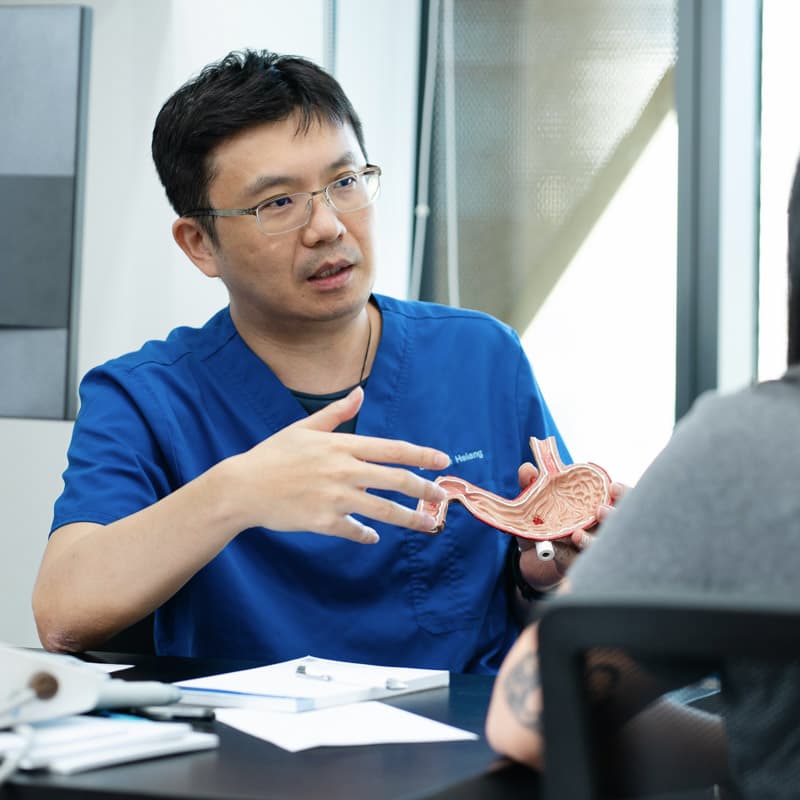Abdominal Pain & Bloating
Abdominal pain and bloating are some of the most frequent digestive complaints, but when they become persistent or keep returning, they may signal an underlying gastrointestinal issue that requires medical attention.
Richmond Gastroenterology Centre
What are Abdominal Pain & Bloating?
Abdominal pain is any type of discomfort between the chest and groin. It may feel sharp, dull or cramp-like, and can come and go or last for longer periods.
Bloating is the sensation of fullness or tightness in the stomach, often with gas or a visibly swollen belly.
While these symptoms are common from time to time, frequent or ongoing discomfort could point to a problem in the digestive system or nearby organs and should be assessed by a healthcare professional.
Possible Causes of Persistent Abdominal Discomfort
- Lifestyle Factors: Eating too fast and not eating on time.
- Constipation: Irregular bowel habits can be a cause of lower abdominal bloating.
- Irritable Bowel Syndrome (IBS): A chronic condition affecting the large intestine, causing cramps, abdominal pain, bloating, gas, diarrhoea and constipation.
- Gastritis: Inflammation of the stomach lining, which can be caused by infection, injury, or overuse of certain medications, leading to a gnawing or burning ache in your upper abdomen.
- Gastroesophageal Reflux Disease (GERD): When stomach acid frequently flows back into the tube connecting your mouth and stomach (oesophagus), it can cause heartburn as well as abdominal discomfort.
- Gallstones: Hardened deposits of digestive fluid that can form in your gallbladder, sometimes causing sudden and intense pain in the upper right portion of your abdomen.
- Inflammatory Bowel Disease (IBD): A term that primarily refers to two conditions, Crohn’s disease and ulcerative colitis, both characterised by chronic inflammation of the digestive tract.
- FODMAP intolerance can cause bloating because certain fermentable carbohydrates are poorly absorbed in the gut, leading to gas production and water retention in the intestines.
How is It Diagnosed?
Your doctor will begin with a physical examination and questions about your symptoms, diet and bowel habits. Common diagnostic tests may include:
- Blood tests – to check for inflammation, infection, or celiac disease
- Stool tests – to detect infections or signs of bleeding
- Abdominal ultrasound or CT scan – to check for structural problems
- Endoscopy or colonoscopy – to look inside the digestive tract
- Lactose intolerance or breath tests – to identify food sensitivities
How to Reduce Bloating and Discomfort?
To reduce bloating and discomfort, start by eating more slowly and chewing your food thoroughly. This helps minimise the amount of air you swallow and supports better digestion. Try to avoid carbonated drinks and artificial sweeteners, as both can contribute to gas buildup. Limiting high-fat and fried foods may also help as they tend to slow down digestion and cause a feeling of fullness.
It’s also helpful to keep a food diary to identify and eliminate any foods that consistently trigger your symptoms. Making these changes gradually can go a long way toward keeping your digestive system more comfortable and balanced.
Early Evaluation: A Key Step in Preventing Complications

Mild symptoms can sometimes mask more serious conditions. What begins as occasional bloating or stomach discomfort may progress into complications and more serious digestive conditions.
For example, untreated acid reflux can damage the oesophagus, while ongoing inflammation from IBD may lead to lasting damage or changes in the digestive tract.
An experienced gastroenterologist can accurately diagnose your condition, rule out other serious issues and develop a personalised management plan to help you find relief and prevent complications.
When to See a Doctor
Occasional bloating is normal, but seek medical attention if you experience:
- Severe or persistent abdominal pain
- Bloating that lasts more than a week
- Unintentional weight loss
- Blood in stool or black, tarry stools
- Fever, nausea, or vomiting that doesn’t go away
- Loss of appetite or early satiety (feeling full quickly)
Treatment Options
Treatment depends on the underlying cause:
- For gas and indigestion: Avoid trigger foods, eat slowly, and try OTC medications like simethicone or antacids.
- For constipation: Increase fibre, fluids, and physical activity.
- For IBS or reflux: Medications, dietary adjustments, and stress management can help.
- For food intolerances: Identify and eliminate problem foods.
- For infections or more serious issues: Antibiotics, surgery, or specialist care may be needed.


